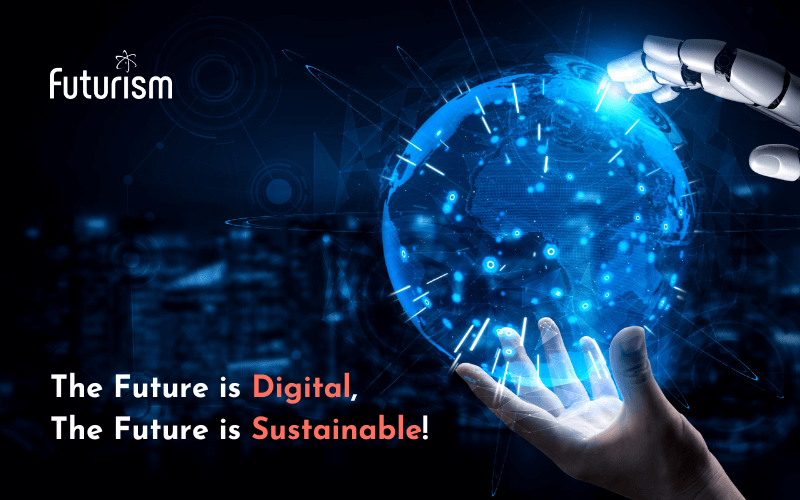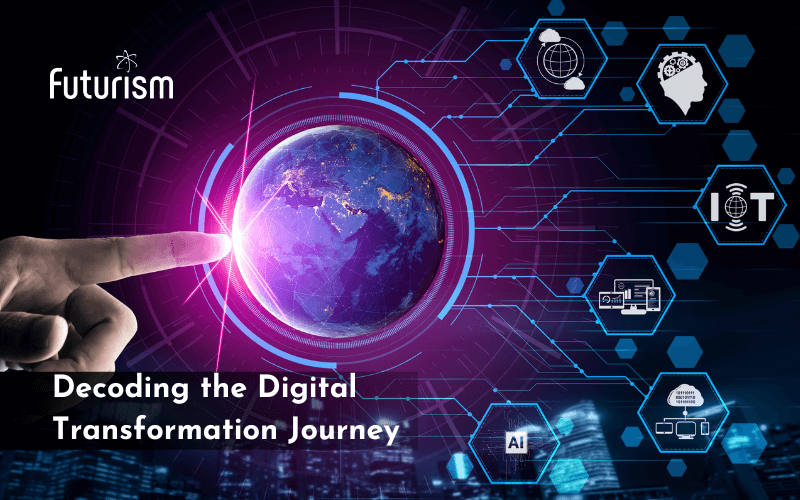2024 Digital Transformation Guide: Revolutionizing Businesses in the AI Era

Futurism Technologies
December 29, 2023 - 3.2K
5 Min Read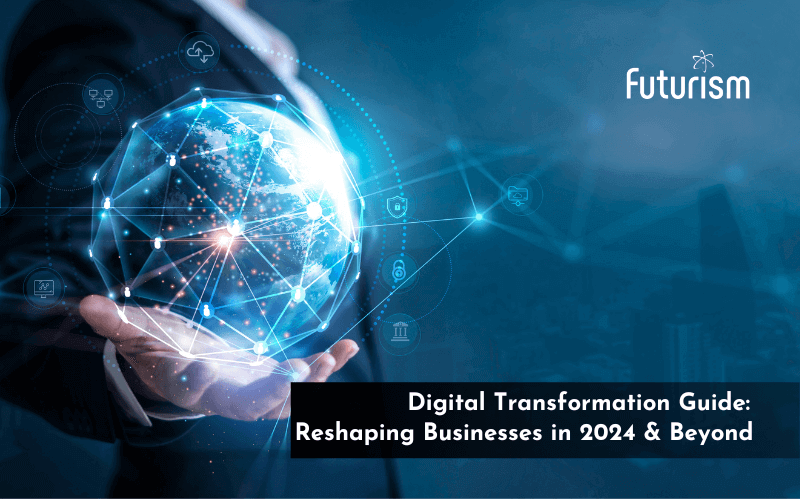
Forget “buzzwords” in 2024, digital transformation (DX) is like life support for businesses. Going ahead in 2024 and beyond, it’s not just about efficiency, but also about survival. Think AI reading your customers’ minds, machines learning on the go, and data leading the way to success. These are not fancy imaginations anymore, they are indeed a reality. Nevertheless, it’s not all robots and wires. The key is empowering people to use smart tools, to adapt and invent. 2024 won’t just reshape industries, it’ll rewrite the rules.
So buckle up, the digital wave is coming, and the only way to win is to ride it. Are you ready to jump in?
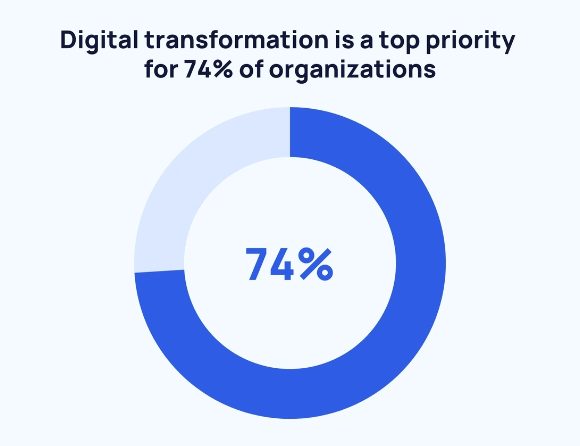
Read also: Digital Maturity: What It Is and Why It Matters?
AI and Machine Learning: Spearheading Innovation
Artificial intelligence (AI) and machine learning (ML) solutions are rapidly changing the world around us, they are no longer just sci-fi concepts. Yes, these solutions are now essential for businesses of all sizes. In the coming year and beyond, AI will be used to personalize customer experiences, streamline supply chains, and make better decisions based on real-time data. As ML algorithms become even more sophisticated, they will unlock even greater insights from the massive amounts of data we generate every day, leading to new and innovative solutions driving industries and operations seamlessly as we see today.
Read also: Top 8 AI Trends to Watch in 2024 and Beyond
The Impact of AI on Profits by Industry
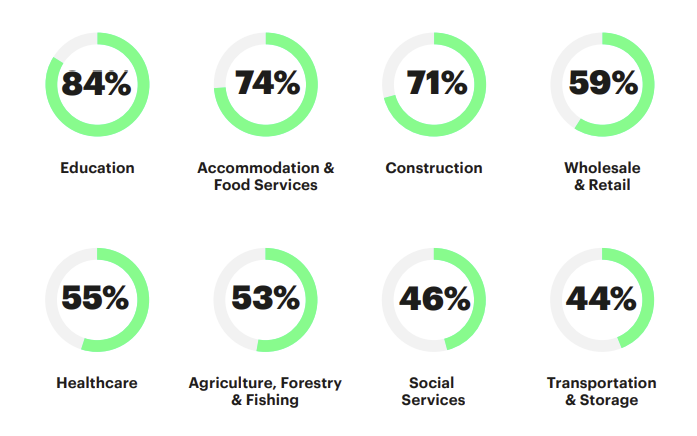
Source: Techopedia
The financial implications of AI and ML adoption are significant and far-reaching. Industries across the board are witnessing a substantial increase in profitability, driven by the efficient and intelligent use of these technologies. For instance, in retail, AI-driven analytics are optimizing inventory management and enhancing customer engagement, leading to increased sales and reduced operational costs. Similarly, in manufacturing, AI-powered predictive maintenance is preventing equipment failures, reducing downtime, and saving millions in repair costs.
Healthcare is another sector where AI is making a substantial impact. By improving diagnostic accuracy, disease detection and personalizing treatment plans, AI in healthcare is not only enhancing patient outcomes but also reducing the costs associated with misdiagnosis and ineffective treatments. In the finance sector, Generative AI in banking is revolutionizing everything from risk assessment to fraud detection, enabling institutions to save on losses and offer more competitive products.
In essence, AI and ML are not just transforming business operations; they are directly contributing to increased profitability in various industries. Companies that adopt and effectively integrate these technologies into their business models are experiencing a significant competitive advantage, marked by enhanced efficiency, reduced costs, and improved customer satisfaction. Whether it’s a small startup or a large corporation, the ability to leverage AI and ML is becoming a key determinant of success in the digital era. As we move forward, the role of AI in driving profitability and shaping the future of business will only grow more instrumental, making it an essential component for any forward-thinking organization.
Big Data Analytics: The New age Gold Mine
The digital evolution has rewritten the rules of the game, and data has emerged as the most prized currency in this new era. Gone are the days of relying on gut instincts and limited market research; today’s successful organizations are data-driven powerhouses, wielding the insights extracted vigorously from vast collections of information to dominate their fields. Big data analytics has become the ultimate game-changer, revolutionizing the way companies interact with markets, understand customers, and develop products.
In 2024 and beyond, this is no longer an optional advantage; it’s the very lifeblood of any thriving business. From predicting consumer trends with unparalleled accuracy to tailoring customer experiences with hyper-personalized strategies, data analytics would empower companies to make informed decisions to stay competitive. The ability to filter through mountains of data, extract meaningful patterns, and translate them into actionable insights through AI-powered knowledge virtualization is the new benchmark for success. Those who harness the power of this digital gold mine will not only survive in the cutthroat world of business, but they will lead the charge, shaping the future landscape with every data-driven step they take.
Read also: How AI is Turning Data into Dollars
Cloud Computing: The Backbone of Digital Transformation
In 2024 and beyond, cloud computing isn’t just a trendy technology, it’s the very foundation upon which businesses would build the groundwork for their digital transformation initiatives. Its power lies in its versatility – imagine stretching and shrinking your computing resources like a magic carpet, adjusting perfectly to your workload. This agility allows companies to dance with the ever-changing market, smartly adapting to new customer demands and trends.
No more clunky, outdated and old-school hardware holding you back – with the cloud, applications are deployed at the speed of light, scaling up or down with ease. This translates to a streamlined, efficient operation, getting your products and services to market faster than ever before. The cloud is the fuel for innovation, the invisible backbone that lets businesses soar in a competitive world. So, in 2024 and beyond, don’t just look to the cloud – embrace it, and watch your digital transformation take flight.
Read also: How Cloud Is Solving the Most Annoying Problems for Online Retailers?
The Impact of Digital Transformation on Industries
1. Retail: Revolutionized by Digital Technologies
The retail industry has undergone a complete transformation, driven by digital innovation. Online shopping has become more personalized and interactive with AI-powered recommendations and virtual reality (VR) fitting rooms. Retailers are using big data to tailor marketing strategies and optimize inventory management, leading to enhanced customer satisfaction and operational efficiency.
2. Healthcare: Improved Patient Care through Digitalization
In healthcare industry, DX has led to significant advancements in patient care and medical research. Telemedicine, electronic health records, and AI-driven diagnostics have improved accessibility, accuracy, and speed in healthcare services. The integration of wearable technology and IoT devices has revolutionized patient monitoring and health data collection.
Read also: How AI is reshaping the Future of Healthcare
3. Finance: Secure and Efficient Digital Services
The BFSI sector has seen remarkable improvements in security and efficiency, all thanks to smart digital technologies. For instance, Blockchain solutions have introduced more secure, transparent, and faster transactions. AI in banking helps to leverage intelligent data-driven algorithms for risk assessment, fraud detection, and personalized financial advice, transforming the way consumers interact with financial institutions.
4. Education: Transforming Learning and Access
Digital transformation in education is reshaping how knowledge is delivered and received. E-learning platforms, virtual classrooms, and AI tutors are making education more accessible and personalized, breaking geographical barriers and catering to different learning styles.
5. Transportation and Logistics: Streamlining Operations
In transportation and logistics, digital transformation has optimized routes, improved fleet management, and enhanced customer tracking services. Blockchain and IoT solutions are ensuring more efficient, transparent, and faster delivery systems.
6. Agriculture: Tech-Driven Agricultural Practices
The agriculture sector is embracing digital transformation through precision farming techniques. IoT sensors, drones, and AI are being used to monitor crop health, optimize resource use, and increase yields, leading to more sustainable and efficient farming practices.
7. Entertainment and Media: A New Era of Content Consumption
In the entertainment and media industry, digital transformation has revolutionized content distribution and consumption. Streaming services, digital media platforms, and interactive content are offering personalized entertainment experiences to a global audience.
8. Energy and Utilities: Smart and Sustainable Solutions
Digital transformation in energy and utilities sector is leading to the implementation of smart grids, renewable energy management, and enhanced data analytics for better resource allocation and reduced environmental impact.
9. Real Estate and Construction: Digitalization of Spaces and Processes
In real estate and construction, digital technologies like VR for virtual tours, AI for market analysis, and digital project management tools are transforming how properties are marketed, sold, and managed.
10. Manufacturing: The Rise of Smart Factories
Digital transformation in manufacturing is giving rise to smart factories where automation, IoT, and AI-driven analytics are optimizing production processes, reducing costs, and improving product quality.
Read also: Smart Factory – The Present of Manufacturing Innovation
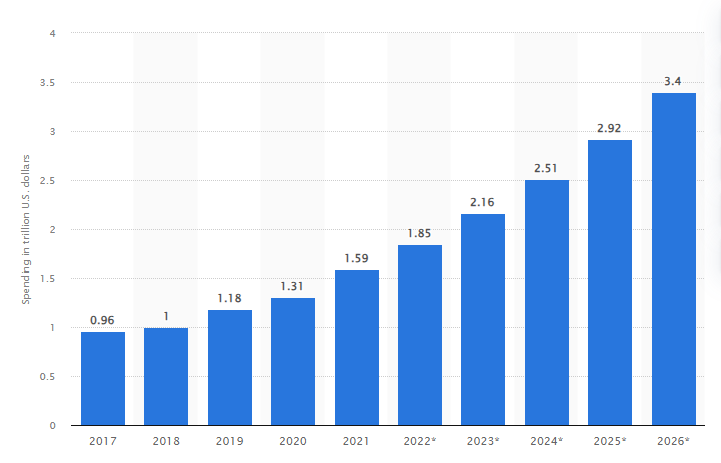
Source: Statista
Challenges and Opportunities in Digital Transformation
Cybersecurity: A Paramount Concern
As digital transformation progresses, cybersecurity remains a paramount concern. The increase in digital transactions and data sharing has led to heightened risks of cyber attacks and threat actors. Businesses must employ advanced cybersecurity solutions to protect sensitive data and maintain customer trust.
Sustainability: Digital Solutions for a Greener Future
Sustainability is another critical aspect of digital transformation. Companies are using digital technologies to reduce their carbon footprint, optimize resource usage, and promote environmental friendly practices. Digital tools are enabling businesses to achieve sustainability goals while maintaining profitability.
Talent and Skills: Bridging the Digital Skills Gap
A significant challenge in digital transformation is the digital skills gap. As technology evolves rapidly, there is a growing need for skilled professionals who can navigate these changes. Investing in employee training and development is crucial for businesses to keep pace with technological advancements and remain competitive.
Takeaway
Digital transformation in 2024 and beyond is not just about adopting new technologies, but in fact, it is about rethinking business models and strategies to thrive in a digitally driven world. Companies that will adopt digital transformation in 2024 will be better equipped to respond to market changes, meet customer expectations, and drive growth. The future belongs to those who innovate, adapt, and incorporate the power of digital technologies to create value and make a positive impact.
At Futurism Technologies, our mission is to deliver cost-iterative, result-oriented and future-proof digital transformation solutions. For more than 20 years, we have meticulously crafted agile digital transformation solutions that unlock the full potential of businesses worldwide. Our digital transformation experts collaborate closely with you to understand your unique needs and deliver results that propel you ahead.
Don’t wait! Leap into the future with us. Contact us now!
Subscribe Now!
TRENDING POSTS
-
Futurism Returns to Hannover Messe 2024: Leading the Charge in Industrial and Digital Transformation
-
The Role of Smart Maritime IoT Solutions in Enhancing Maritime Safety
-
Data Integration Unlocked: From Silos to Strategy for Competitive Success
-
Navigating the Shadows: Understanding Zero-Click Attacks in the Digital Age
-
AI Reimagined: Crafting Next-Gen AI Apps with Expert Fine-Tuning
-
Explore Next-Gen Digital Solutions with Futurism at MWC 2024
-
Futurism Unleashes the Technology of Tomorrow at MWC Barcelona 2024
-
Futurism AI: Turning Ideas into Apps at Lightning-Fast Speed
-
Accelerate AI Across Your Enterprise With Futurism AI
-
Futurism to Address the Biggest Security Challenges at RSS 2022
-
Futurism at SelectUSA 2022: Steering the Next Wave of Businesses
-
Futurism to Uplift the MSP Business Community at the MSP Expo 2022
-
Futurism Sets Out to Address the Biggest Security Challenges at the RSA Conference 2022
-
5 Ways to Prepare Your Business for Digital Transformation
-
4 Ways To Win at Digital Transformation on a Shoestring Budget
-
Futurism: Empowering MSPs at the Channel Partners Conference & Expo 2022
-
Why AI in Digital Marketing is the Next Big Thing?
-
Futurism brings ‘Mobile First Digital Transformation’ to the fore at MWC Barcelona 2022
-
Cybersecurity for Rural Hospitals: How can Rural Hospitals become Cyber Smart?
-
Futurism Empowers Rural Health Care Community at the AHA Rural Health Care Leadership Conference
-
The Biggest Problem With Cybersecurity In Healthcare Sector, And How IBM QRadar Can Fix It?
-
How IBM MaaS360 is Revolutionizing Endpoint Security in the Healthcare Industry?
-
Futurism to Present its MSP Partner Program at the Channel Partners Conference & Expo 2021
-
EndPoint Security in Healthcare Matters and IBM MaaS360 Can Help
-
How AI Will Enable Faster Adaptation of Digital Transformation
-
How Is Digital Modernization Important In Supplier On-Boarding?
-
Top 10 Email Marketing Tips for This Holiday Season
-
Benefits of using ERP Software for Energy and Gas Industries
